Tiny House Hot Water: On-demand propane water heaters and important lessons learned
I've talked about options for doing laundry in a tiny house, but what about some of the even more basic needs? For most of us (unless you are really roughing it), hot water is something very important. Many people don't know what the best options are. Here's my opinion...
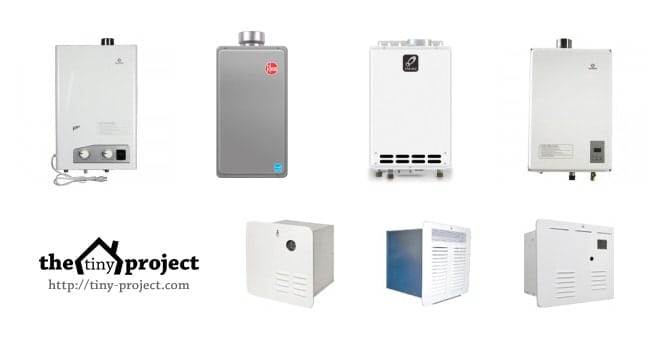
Benefits of a propane on-demand water heater
When it comes to hot water in a tiny house, I'm convinced that a tankless, on-demand system is the best option. There are electric tankless heaters and propane/natural gas heaters. Both are great. Electric models tend to be a bit cheaper, but any electric heating elements will use a lot of power. Since many tiny housers are thinking to live off-grid (or might want that option in the future) or are just more conscious of their overall energy use, I believe a propane tankless heater is the way to go. Here's why:
- On-demand heaters offer a limitless supply of hot water
- Propane is relatively cheap and reliable for on- or off-grid living
- Tankless propane heaters only heat water when needed - they do not use energy keeping water hot in a tank
- High efficiency units can heat a lot of water with very little propane cost
Things to research about each model you are considering:
- BTU output or max GPM flow rate at certain water temps - make sure the output matches your needs
- Minimum GPM activation rate and min flow rate to remain activated (lower is better for hot water even when a tap is not turned all the way on)
- Size, installation/clearance and venting requirements
- Freeze protection built-in?
Beware of Freezing Temps!
On-demand propane heaters come in two varieties: Those meant for indoor installation and those meant to be installed outdoors.
Though outdoor units are easier to install because they do not require the same venting (indoor units must pull fresh air in from the outside and vent out combusted propane gasses), they can also create some problems, most notably freezing. Everyone's climate is different, but if in winter it gets below freezing in your neck of the woods, then think carefully about how to protect your heater from damage when water freezes. In addition to the water coming in and out of the heater from your supply lines, hot water heaters can also collect condensation, which can drip down into the unit, and then freeze, causing damage to the propane heating mechanism. I've heard stories of people's water heaters breaking in the first hard freeze and then them not having hot water for a good part of the winter.
For this reason, I think most tiny house builders should consider an indoor unit (vented properly, of course). This way, the entire unit, including water supply lines, can be included within the insulated portion of house, preventing it from freezing in all but the most frigid temperatures.
Residential vs. RV units
In addition to indoor/outdoor options, there are also Residential units and those designed specifically for RVs. More options exist in the residential market, with some being cheaper, but use caution here as well. Some water heater manufacturers do not consider installation in a tiny house as acceptable use of the product, and may not honor their warranty or offer any kind of support or service (read below for the lesson we learned the hard way).
Here's a rundown of some of the more popular options (both residential and RV).
Residential
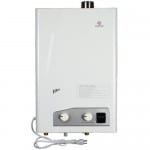 Eccotemp FVI12-LP
Eccotemp FVI12-LP
Lower output suitable for hot water for one appliance use at a time. Cheaper, but with more plastic materials used.
 Eccotemp 40HI-LP
Eccotemp 40HI-LP
(currently $549 from Eccotemp)
Higher output than above model, suitable for small family home or multiple hot water uses at the same time.
 Takagi T-KJr2 (website)
Takagi T-KJr2 (website)
(currently a VERY GOOD deal at $545 on Amazon)
High output suitable for small family home. 80+% efficiency.
 Rheem/Richmond RTG-64 (website)
Rheem/Richmond RTG-64 (website)
High output suitable for small family home. Very low 0.40 gpm minimum activation flow rate. 80+% efficiency. Freeze protection.
Editor's Note: We chose this model. I did not know this when purchasing, but Rheem's installation guidelines specifically state that the product is not intended for RV or mobile home use -- they will not honor the warranty (more on this in a future blog post). This is likely the case for all residential models, with the possible exception of those from Eccotemp, who is more tiny house friendly (based on the anecdotes I've heard).
Rinnai V65IP
Thanks to Sean David Burke for finding this great alternative. While listed under the residential category, this unit is also "Certified for Installation in Manufactured (Mobile) Homes," so can be used in a tiny home without voiding the warranty.
Very similar specs to the Rheem unit above: high output suitable for small family home. Very low 0.40 gpm minimum activation flow rate. 80+% efficiency. Leak detection w/shutoff.
RV
These heaters are designed for RV or "mobile home" use. Typically these units are more compact and are installed in the wall cavity itself. This means they are more of an indoor/outdoor type, without the need for venting, but more exposed to the cold. Some include freeze protection features. These units will create more thermal bridging as the section of wall where installed will not be well insulated.
 Suburban SW6DE RV Water Heater
Suburban SW6DE RV Water Heater
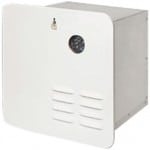 Girard Adjustable BTU Tankless Water Heater
Girard Adjustable BTU Tankless Water Heater
Cheaper price tag, but lower 36,000 BTU output. Requires min 1.o gpm flow rate for activation.
 PrecisionTemp RV-550 NSP Tankless Water Heater
PrecisionTemp RV-550 NSP Tankless Water Heater
Highest price tag for highest 55,000 BTU output.


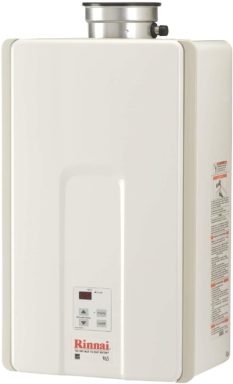
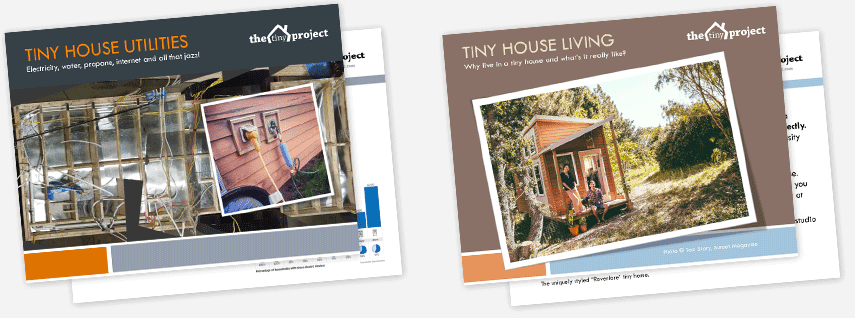
Tiny living mean off-grid in most cases and if we are talking about off-grid, propane is THE viable choice. Using a generator to make electric is just too inefficient to consider in my opinion. Tankless is great for both minimalistic and off-grid living not only because of energy savings but also because of the space savings. Some propane tankless water heaters that go by the names “portable” or “camping” can be pretty small and be fit anywhere but you need to know what you are doing with the venting.
It is a good idea to have a back up plan for when you run out of propane. I keep a bucket heater for heating water. It may be electric, but let's face it, most will never go completely off grid. A bucket heater is inexpensive and takes up little space.
I'm glad I read this article a propane heater is great for a smaller house or cabin. I like that it will heat up to where I want the water to be. You can get more for the amount of propane that you use too. Great idea I'll have to check it out.
Hi, this is an old post, but hoping someone is listening. How about the water temperature vs. The time it takes to heat it? I live in CO and the water temp out of the ground is cold, probably colder than most.. does this make a difference in determining a tankless heater?
Thanks, Alane
Hi Alane,
If you click through to some of the water heaters linked on this blog, they will all give specs about the flow rate and the max temperature rise that is possible. Typically, if you are just using water for one shower or one other thing at a time, then a normal sized residential heater (or RV heater) will be able to heat enough water to a very high temp, even if starting out near freezing temps. My heater (Rheem) does this just fine even when incoming water is near freezing. You just need to look at the specs for each you are considering and make sure the one you get one that can do the job. Mine for examples says: "6.8 gal./min. at 35A-Degree F rise max. - 5.3 gal./min. at 45A-Degree F rise max." - so you'll see the gal/min flow rate for a given temperature rise. The flow rate will obviously be lower the greater the temp rise.
Alane,
Yeah, the water temperature does make a difference. Colder water equals lower flow rate. I'm building a small cabin to live in full-time in Oregon where the winters can bring a lot of snow and cold temps. My water will be cold going in, too.
Something else that wasn't addressed is the amount of propane used. I first looked at the Tagaki-JR but I didn't want to have a big ole propane tank buried just to run that! High BTUs can mean high propane consumption/requirements for good output and operation.
I've decided on the Girard on-demand RV model. There's a newer model out that contains a microprocessor and has a programmable temperature feature. It goes up to 43,000 BTUs now, I believe. It has freeze protection features, too. Since my cabin will be insulated, it will be better protected in my cabin's wall than it would be in an RV.
With pipes exiting my cabin walls for my pellet stove, my compost toilet, and my greywater system, the last thing I want is ANOTHER big ole pipe coming out for an on-demand hot water heater. The RV unit thankfully doesn't require all of that. I'll just have a gas line connecting both my LP range and the water heater.
I was looking at the Takagi but seeing your comment has me interested in the Girard as well. Do you know how the BTUs of the Takagi vs. the Girard translate to actual propane usage?
I'm sorry, but I do not. Both with be efficient and so I wouldn't think there is a huge difference in actual usage.
Oh yes. Our well water arrives at 33 F and the eco temp L5 can barely heat that to a good bath temp. But we fill a cistern from the well and after a day or so the cistern has warmed and all is well. Until fill day returns!
As mentioned, tankless electric heaters are inexpensive and small, so one solution I have read about is using electric at the source (i.e. a shower, under the sink, etc.) with a propane or gas model backing it up.
I am on a cistern with hauled water that I pay for (also in CO) and it does take some time for the heated water from my propane on-demand heater to reach the source, wasting that cold water. Allegedly the electric heat is nearly instantaneous, then when the propane-heated water reaches it, it shuts down.
Yes go propane not electric.
I use the Precision Temp RV-550 NSP Tankless Water Heater. Quick to heat water, vents into the floor instead of my roof, and Made-in-the-USA!! Oh and the 2 yr warranty specifically covers Tiny Houses!
Got mine here with free shipping: https://www.tinyhousesinside.com/collections/heat-water/products/precision-temp-rv-550-tankless-water-heater
How are you and your heater doing?
Hi, I bought an eccotemp on demand water heater and when I really went off grid, I discovered it needed electricity to start and the whole time it was running. I reluctantly bought a propane generator, but by the time I did that my water heater was rusted out. Is there a water heater suitable for a tiny house that does not need electricity? I really don't want to go outdoors to start the generator when I need hot water.
I have not evaluated any of them, but I know there are some models like https://amzn.to/2cK2b53 that run on a battery instead of AC power. Not sure what other brands might offer something like this, but look for those with a battery ignition. I hope that helps.
We have been using a Rinnai for 8 years and have found it quite good. Two showers at once, filling a hot tub, high or low flow, all these tasks are accomplished consistently.
We've just finished our own tiny house build. Steel and aluminum and lots of spray foam, it is highly thermally stable and stays cool with only300 watts of power demand via a Fujitsu mini-split. One lithium battery powers the whole house.
I happiest with very few posssesions and like a clean and open space to keep clear. We've a 9'x 8' bay of windows the sofa faces. We are next building a high thermal mass water house that will maintain comfort without electricity most of the time. Simple,comfortable, and beautiful is the goal.
Best , Doug Johnson.
We're looking at one on Amazon, the Marey Power Gas 10L Tankless Water Heater. It just uses 2 D batteries to run the spark igniter. https://www.amazon.com/Marey-Power-Propane-Tankless-Heater/dp/B00886CZA6
Hi Walt,
Did you end up buying that hot water heater? I am also looking for a small on-demand that works with no electricity.
Eco temp makes one that uses D-cell batteries
Just an update...the precision temp 550 now has a newer model that allows for venting through the floor.
PrecisionTemp also has a Dual-zone tankless water and hydronic space heating for cabins and tiny houses
For information please call -1800-934-6360 or e-mail sales@precisionctemp.com
Further detail: The Installation manual says to use 3/4" supply pipe to achieve an 11" W.C. supply pressure, and that "inlet gas pressure that falls outside the range of values listed above [Min. 8.0" W.C. - Max 14.0" W.C] may adversely affect the performance of the water heater." So it looks like 3/8" copper tubing is out. And the outlet of the regulator I bought is 3/8". I don't know if there are any other options than to buy a big-ass propane tank. Ideas?
p.s. I wouldn't recommend buying this to anyone until you are sure what it requires to hook it up. I wish I had known.
Follow-up: My Takagi T-KJr2 is now up and running. I am trying it with two 7-gallon propane tanks for now and will have to get a bigger tank if this doesn't work, but so far it seems to be fine. I did order a regulator with a 3/8" output house that is then connected to the 3/4" pipe at the tiny house with the necessary fittings. Since I haven't yet run out of propane, I don't know how long a tank lasts with a small stove and the water heater.
I know that outdoor water heaters have various advantages like they are ideal for families living in farmer climates and easier, cheaper, and faster to install. However, I still have questions that what are the differences between indoor and outdoor tankless water heaters? And what is better? Hoping you can willing to answer my questions. Thanks!
Neither are really better. Outdoor units are sometimes designed to withstand colder temps, but can still freeze, so check the specs of anything you plan to buy and consider your climate. Indoor unites are protected from cold and from the elements, so may end up lasting longer. Some people prefer to have them outside because they don't trust having the propane in the house (though it's perfectly safe), or because you won't hear the heater as when it's outside. There are pros and cons to each.